New Program in California: Telecare EMPOWER
/We are pleased to announce that Telecare EMPOWER opened on March 8, 2021!
Read MoreWe are pleased to announce that Telecare EMPOWER opened on March 8, 2021!
Read MoreWe are pleased to announce that Telecare Shelton Next Steps opened on August 19, 2020!
Read MoreWe are pleased to announce that the Muriel Wright CRT program opened on February 18, 2020!
Read MoreWe are pleased to announce that Vida ACT opened September 16, 2019!
Read MoreAt the California National Alliance on Mental Illness (NAMI) Annual Conference 2019 in Newport Beach, California, Telecare’s Sarah Nudel and Robin Weintraub were honored to present on the Behavioral Health Court Model, a specific program type designed to serve individuals who have mental health needs and are involved with the criminal justice system. We are pleased to share the presentation below.
Telecare Corporation has provided services to individuals with serious mental illness and co-occurring justice involvement issues for more than 15 years. The focus of this year’s NAMI CA presentation was the Behavioral Health Court (BHC) model, a treatment modality that Telecare offers for the community through programs in Orange County and San Diego County, California.
The BHC model has been a productive and effective model to support individuals with serious mental illness who are on probation, to help them regain and maintain stability, fulfill the obligations of their probation requirements, prevent recidivism into the criminal justice system, and take steps toward a healthier future, a more stable life, and meaningful roles in the community.
The Behavioral Health Court Model is a collaborative process with multiple stakeholders. Here’s the BHC role breakdown:
Focus on mental health treatment
Sensitive to privacy
Recovery-focused
Community linkages
Mental health visits at home/in the field
Teach effective choice-making
Power aware
Seek to awaken internal motivation
Focus on accountability
Community supervision
Monitor conditions of release (COR)
Community linkages
Perform visits and searches at home
Focused on compliance, not choice
Power-over
Use COR and sanctions as external motivation

Program length is a minimum of 18 months, but members typically stay 2-3 years.
BHC is a day program model where clients participate in groups based on where they are in their recovery process in the program. Programming focuses on evidence-based practices to support recovery, reduce criminogenic behaviors, and support the individual in making forward progress in the program. Case managers link members to community resources.
After graduation, members are transferred to outpatient clinics at an equal or lower level of care depending on the presenting need.
Sarah Nudel, Administrator at PROPS, CORE, and BHC
Robin Weintraub, Administrator at Whatever It Takes (WIT)

Christina Roberts, driver at Telecare steps orange county and former WIT member
September is National Recovery month. It is a time dedicated toward educating Americans that substance use treatment and mental health services can enable those with symptoms of a mental health diagnosis and/or substance use to live healthy, rewarding lives.
At Telecare, we not only treat those with co-occurring disorders, but also take pride in employing former clients who have lived experienced and continue in their recovery journey. Christina Roberts, a driver at Telecare STEPS Orange County, shares her inspiring example. By harnessing life’s setbacks, Christina has shown that it’s possible to navigate to destinations the previously may have seemed impossible.
“When I come into work now, I'm giving back. I can relate. I had a drug and alcohol problem. I now have two years clean. I struggled with homelessness, drug addiction, and mental illness. I hope that I can just take one member and lead them in the right direction and help change their life like it's changed my life,” said Christina.

After getting into trouble and ending up in front of a judge for sentencing, Roberts was given two choices: serve jail time or participate in the Orange County Collaborative Court (WIT) program. WIT, which stands for “Whatever It Takes,” began in 2012 as a collaboration between Telecare and the mental health courts of Orange County. It’s a four-phase, voluntary program where members who have a demonstrated history of mental illness are put on conditional release from prison.
While in WIT, they are required to be sober, transition up to new phases, and ultimately graduate from the program. The goal is to equip those in recovery with new skills and resources—things they might not receive through incarceration.
“To be honest, I had a relapse. It was too much. It was overwhelming. I was scared. I didn't want to follow directions. I wouldn't submit to the program,” she admitted. “I got arrested. When I got arrested, I had to serve some time, but then Telecare took me back. They gave me a second chance. WIT stands for ‘Whatever It Takes,’ and they stood by what that means.”
Christina then fully embraced WIT, the support groups, and most importantly, her peers. Actively participating in the programs is also what helped her find her true calling—wanting to go from Telecare member to Telecare employee.
“When I came back from my relapse, I told my probation officer and the staff at Telecare that I was going to work for Telecare. I didn't know how it was going to happen. A few months later, I spoke at an FSP luncheon and I got three job offers,” Christina said.
She chose to accept the offer as a driver at STEPS and hasn't looked back.
Christina credits Telecare for being the driving force in her personal recovery—a force that stood with her and believed in her when no one else did.
“Telecare saved my life,” said Christina. “It provided stability, and it's shown me how to become a productive member of society. It taught me that I can make it in this world and have a mental illness.”
On June 1, the Orange County Assisted Outpatient Treatment (AOT) program in Santa Ana, California, welcomed the community to celebrate at their open house hosted in their new facility.
Guests included the AOT judge, county counsel, public defender's office, members and their loved ones, a representative from First District Supervisor Andrew Do's office, and other Telecare program staff.
The open house featured a fun photo booth and a slideshow with information about the program's success, staff, and highlighted a few of the program participants. "The open house had a great turnout," said Administrator Anna Bowes. "We look forward to continue servicing the communities in Orange County!"
Telecare's Orange County AOT program opened in November 2014 and expanded in July 2016. This community-based program is based on the Assertive Community Treatment (ACT) model and prescribed for adults with serious mental illness who are experiencing repeated hospitalizations or incarcerations, but are not engaging in treatment. AOT services include intensive case management, housing assistance, vocational and educational services, medication support and education, co-occurring services, and 24/7 support and availability.

In April 2017, Telecare will begin training and preparation to use the FROST assessment in all criminal justice-based programs to help identify people at high risk of recidivism.
“We’re testing the FROST because we need to know which criminogenic needs are highest for our members, so that we are able to drive the appropriate interventions and treatment,” said Gary Hubbard, Vice President of Operations of Southern California and Arizona.
“Studies have shown that programs that target high criminogenic needs with members have a higher success rate and reduced recidivism.”
The assessment is called the Field Re-Assessment of the Offender Screening Tool (FROST).
Telecare’s Justice Involved Mental Health (JIMH) subcommittee chose the FROST because:
It is quick to complete
It can be administered by non-licensed staff
It measures for criminogenic risks
It is reasonable in cost
According to Hubbard, the subcommittee chose the FROST over another potential tool used by the Arizona court system— the Offender Screening Tool (OST) — because the OST was a pre-release measure. The FROST, by contrast, is used in the community and measures the eight criminogenic need areas that can lead to recidivism.

Telecare’s clinical leadership team will attend a free FROST training provided by the Arizona Supreme Court staff on April 11. Telecare's leadership will also participate in a train-the-trainer event that will be offered in the fall to build the expertise to distribute the FROST more widely to our existing JIMH programs.

Orange County AOT Facility in downtown Santa Ana
On March 7, Telecare’s Orange County Assisted Outpatient Treatment (AOT) program in Santa Ana, CA, moved into its new facility to accommodate their recent service capacity increase from 25 to 120 persons.
"Our amazing team will continue to offer services in the community, but we are so excited to have this new program site for members to feel included, safe, and valued," said Anna Bowes, Administrator for the Orange County AOT program. "The team is really looking forward to creating a community with our members. We plan to start an art gallery and offer gardening on our patio."
Originally co-located with Orange County STEPS, the Orange County AOT program is now located directly across from the Central Justice Center in downtown Santa Ana.
The space will serve as an important resource for providing more personalized care. "Now that we are closer to the Central Justice Center, we can offer hearings with an AOT judge at the program for our members who are not as comfortable at the courthouse,” Anna said. “We are also currently working with Orange County Health Care Agency and Genoa Healthcare to have an on-site pharmacy. We hope this service will increase access and efficiency in getting members connected with their medications.”

For many members in the program, access to the proper care and resources can mean a world of difference. "I have been with other programs in the county and have left the state because I had a difficult time with the program rules," said an AOT graduate. "I felt like I as being pushed around a lot and I had a hard time living."
"Ever since I’ve been with AOT, I began making a comeback," he said. "I like AOT program a lot— it has been easy and the staff are very nice. I haven’t been to the hospital in almost five months and I received psychiatry and medication services with the help of AOT."
The member's mother is especially thankful for the services her son has received. "I feel like I have my son back," she said. Although the member graduated, he has chosen to remain in the program voluntarily.
The Orange County AOT program launched in October 2014. It was Telecare’s first Laura’s Law program and has seen eight clients graduate since it opened—one of which has been connected with outside Full Service Partnership (FSP) programs or psychiatrists for continued support in their recovery, while the other seven remain with the program on a voluntary basis.
The information below compares hospitalization and incarceration statistics of members before and after they have been admitted to the OC AOT program from July 2016 to February 2017.
Learn More:
For more information on our JIMH programs, click here.
Read more about the early success of the OC AOT program from our Court-Ordered Newsletter.
For many members in sub-acute facilities who are transitioning from state hospitals, reintegrating into the community can
be a daunting task. The Recovery Center at Woodburn (RCW) in Oregon offers its members the opportunity to empower themselves through activities like volunteering in their local community.
Sarah Lahey, a Rehab Therapist at RCW, has shared a story about the recent recovery success of RCW member, Alan, below.
***

(L-R) WOODBURN VOLUNTEERS CHRIS R., ALAN S., OLIVER P., WITH FOOD BANK SUPERVISOR WILBUR
It began last spring when one of our residents, Alan, came to me with a confession that he’d been keeping to himself for a while. Initially, Alan shared that he had been wanting to do something outside of the Telecare walls, something to help people, to give back in some way, or perhaps find something that could give his own life more meaning. We discussed the idea of volunteering and Alan really got excited when I mentioned volunteering at a local food bank. Almost in the same moment, however, Alan's hopefulness seemed to fade; something else was bothering him.

Sarah Lahey, Rehab Therapist
After a little encouragement, Alan confessed that he was terrified of putting himself out there. "What if people want to know things about me?" he asked. "What if they ask me questions about myself that I don’t want to answer? What if people find out about the things I have done? What if they judge me?" Alan confided this was not something he wanted to face, and in fact, has strategically avoided every day since being released from the state hospital. I had to confess too that I couldn’t protect him from what we did not know. However, I did promise that I would do everything in my power to help him find a place to volunteer where he would feel safe and respected.
Amazingly, the next day, Alan and I walked into the local food bank in Woodburn, where we met Wilbur, the Supervisor for the Woodburn Food Dispensary. Right away Wilbur made a connection with Alan. He had good eye contact, a non-threatening demeanor, and made a few silly jokes, just enough to remind us he’s fallible. He said he desperately needed volunteers and asked when Alan could start. Even better than that: he required no resume!
Almost eight months later, Alan is now working three days a week, is recognized as a leader on the floor, and is often asked to be in charge of locking up at the end of the day. Along with two other residents, Oliver. and Chris, these individuals have developed a strong reputation for their willingness to do what it takes to keep our local food bank running.
When I asked Alan what he does at the food bank, he responded, "Whatever I can do. I unload trucks, I sort and shelve food, I wash floors, I help customers, and I help my co-workers. Basically I'm there to help with anything, and anything they want me to do, I’ll do." I asked him if he still feels afraid of people, or if anyone has ever asked about his life. He said, "No one cares because we’re too busy! I still feel vulnerable, but I'm conquering my fears by keeping focused on my job. I work with all kinds of people–parolees, poor people, people who speak a different language–and I think: maybe they’re as scared as I am sometimes, so I just try to be kind."
What Alan has yet to be recognized for is the way he takes ownership of the place. From cleaning up the messes that others ignore, to restocking missing items without being asked, simply because, in his words, it gives him a great sense of satisfaction knowing it has been done, that he gets the job done.
When I checked in with Wilbur a few weeks back he said, "I sure like these Woodburn Recovery guys, they’re dependable, trustworthy, and respectful! Any chance you have any more guys for me?"
Telecare's Los Angeles Step Down program offers services to members who are determined to be mentally incompetent to stand trial (MIST). The MIST program provides defendants direct linkage from the Los Angeles County Mental Health Court/Department 95 to receive treatment in Telecare's Step Down program, where clients receive structured housing support, competency training, and an array of mental health services in the community.
Telecare LA Step Down has shared the success story of member Richard Davis.
***

Richard Davis, Graduate of Telecare LA STEP DOWN Program
Richard Davis became a member of our program on December 23, 2015 when he was found incompetent to stand trial for a misdemeanor charge. After enrolling in our program, Richard initially presented himself as quiet, reserved, and withdrawn. Over time, he gradually began to open up and interact with his peers and the team. His love for the library, where he could read books and access the internet, was a significant source of support that helped him cope with his symptoms. After returning from the library, he would often share with the team what books he had read and tell the team how grateful he was for their assistance in locating a nearby library.
Another sign of Richard's recovery and growth was his participation in groups where he would share with other members what his symptoms were and what he was doing to keep them from interfering with what he found enjoyable in life. Richard frequently reached out to others in the program and provided encouragement and support. "I'm in a better place now and happy where I'm at because of what the Step Down program has helped me with," he said.
Richard's positive attitude and willingness to utilize the various resources the program provided to him helped facilitate
his growth and recovery. After being in the program for less than seven months, Richard indicated that he felt ready to be referred to an adult Full Service Partnership (FSP) program after his final appearance in mental health court on
October 19, 2016.
On September 2, 2016, Ashley Mills, Project Director for the California Mental Health Services Oversight and Accountability Commission, asked the Public Defender's Office if they had candidates who could share their personal experiences receiving mental health services in the MIST/CBR program at the commission's subcommittee meeting on September 21, 2016. The Public Defender’s Office identified Richard as a candidate and he happily accepted the invitation to speak.

Christopher Lee, Public Defender Psychiatric Social Worker, attended the meeting Richard spoke at and shared his perspective on Richard’s talk.
"I wanted to let you know what a great job Richard did at the Mental Health and Criminal Justice Subcommittee meeting this morning. He spoke very highly of your program, and how your team has helped him gain insight into his mental illness and provided him with support in his recovery. He was very articulate, and everyone who attended greatly appreciated what he had to say," Christopher offered. "By speaking at the meeting, Richard was able to provide the subcommittee with insight into what has helped in his recovery, and demonstrated to them how important the MIST/CBR program is. I also want to commend your team for all that you do for our clients. Your program has given Richard stability, which has allowed him to focus on his recovery, and improved the quality of his life. Richard is just one client of the many who have benefited from your program."
As Richard continued to engage with the team and get close to his graduation, he reflected on his time with the team and reiterated, "I'm so grateful for all you have done for me."
Richard has now transitioned to another residential setting and shared with the team during his final court appearance how happy he was that they were able to find a residence for him within walking distance of a public library. "I'm overjoyed how close it is to where I now live," he said.
Richard will shortly begin utilizing adult FSP services to further his recovery journey, and the LA Step Down team is sincerely grateful to have been part of it.

According to a recent article in USA Today, people who have a mental illness are 16 times more likely than others to be killed by police. Police departments and policy makers are exploring strategies to break this trend, including training in
de-escalation techniques.
At Telecare, however, we believe that effective treatment is the best approach. Our hope and goal is to prevent crises and avert tragedies before they ever begin.
How are we doing this? We're constantly implementing new approaches to improve our ability to help clients with serious mental illness address their criminogenic needs to live more stably and successfully in the community.
Two tools we’re starting to use are Risk Needs Responsivity (RNR) and Moral Reconation Therapy (MRT).

Regional Director of Telecare's Central Coast and CORE LA program
"Those tools are extremely important for people who are in justice-involved mental health programs to transition into lower levels of care," said Cheryl Malinowski, Regional Director over Telecare's Central Coast and CORE LA program. "Increasing that awareness and knowledge, and having the expertise to help with the people out of incarceration is how our programs can ensure that they are setting up their clients for success."
"That's really our goal," said Gary Hubbard, Vice President of Operations of Southern California and Arizona. "We truly want our clients to be able to live successfully on their own in their community and make sure they have what they need to create a better life for themselves."

Gary Hubbard, VP Operations of Southern California and Arizona
We're researching and testing an array of targeted risk assessments to help us quickly identify people with the greatest risk and the greatest need.
"By developing an assessment for people who are at the highest risk for reoffending or going back to jail, we begin to understand the criminogenic needs that are getting in the way of them being able to stabilize in the community. Once we figure that out, we can focus our treatment and services around those specific needs," Gary said.
Telecare currently has 13 justice involved mental health (JIMH) and seven court-ordered care programs.
Our programs are working to address all seven criminogenic needs using a variety of interventions and approaches. The most notable right now include: trauma-informed care, Thinking For A Change, and cognitive behavioral therapy (CTB). We have found that including our own RCCS with these interventions can give clients the specialized help they need to lower the likelihood of re-offending or being involved in police altercations.

Telecare’s San Diego Assisted Outpatient Treatment (AOT) program opened the doors to their new facility on August 26. Created in partnership with San Diego County Behavioral Health Services, the San Diego AOT program celebrated their new facility with an open house which was attended by many community providers and San Diego County Administration.
The San Diego AOT program launched on April 1 and is the first Laura’s Law program in San Diego County. Laura’s Law is legislation that allows for court-ordered intensive outpatient mental health treatment to individuals who have not accepted treatment and meet the nine criteria listed in the law.
Referrals for the San Diego AOT program are coordinated through the county’s two In Home Outreach Team (IHOT) providers— Telecare and Mental Health Systems Inc.— to ensure that services are available to all residents. Originally created as an alternative to Laura’s Law programming, IHOT staff go into the community to engage hard-to-reach individuals who are in need of mental health services. If the individual refuses, but meets the nine criteria, they then may be court-ordered to receive treatment in the AOT program.
(L-R) Leslie Barden, Scott Jackson, Elvia Escobar, Natalie Blair, Christine Ortego, Jane Flaherty, Zenaida Vega, Amy Siez, Sandra Tello, Vivian Alvillar, and Martin Ponciano.
Sofia Castillo, Jessica Gasior, Liz Heinz, Lana Konovalova
(L-R) Gary Hubbard, Vice President of Operations of Southern California and Arizona; Holly Salazar, Assistant Director, Departmental Operations Behavioral Health Services; and Mary Woods, Regional Director San Diego County and Arizona
Natalie Blair, AOT Administrator and Chris Crosby, Talent Acquisition Manager
(L-R) Gary Hubbard, Vice President Vice President of Operations of Southern California and Arizona; Natalie Blair, Administrator; and Mary Woods, Regional Director San Diego County and Arizona
(L-R) Jane Flaherty, Scott Jackson, and Vivian Alvillar.
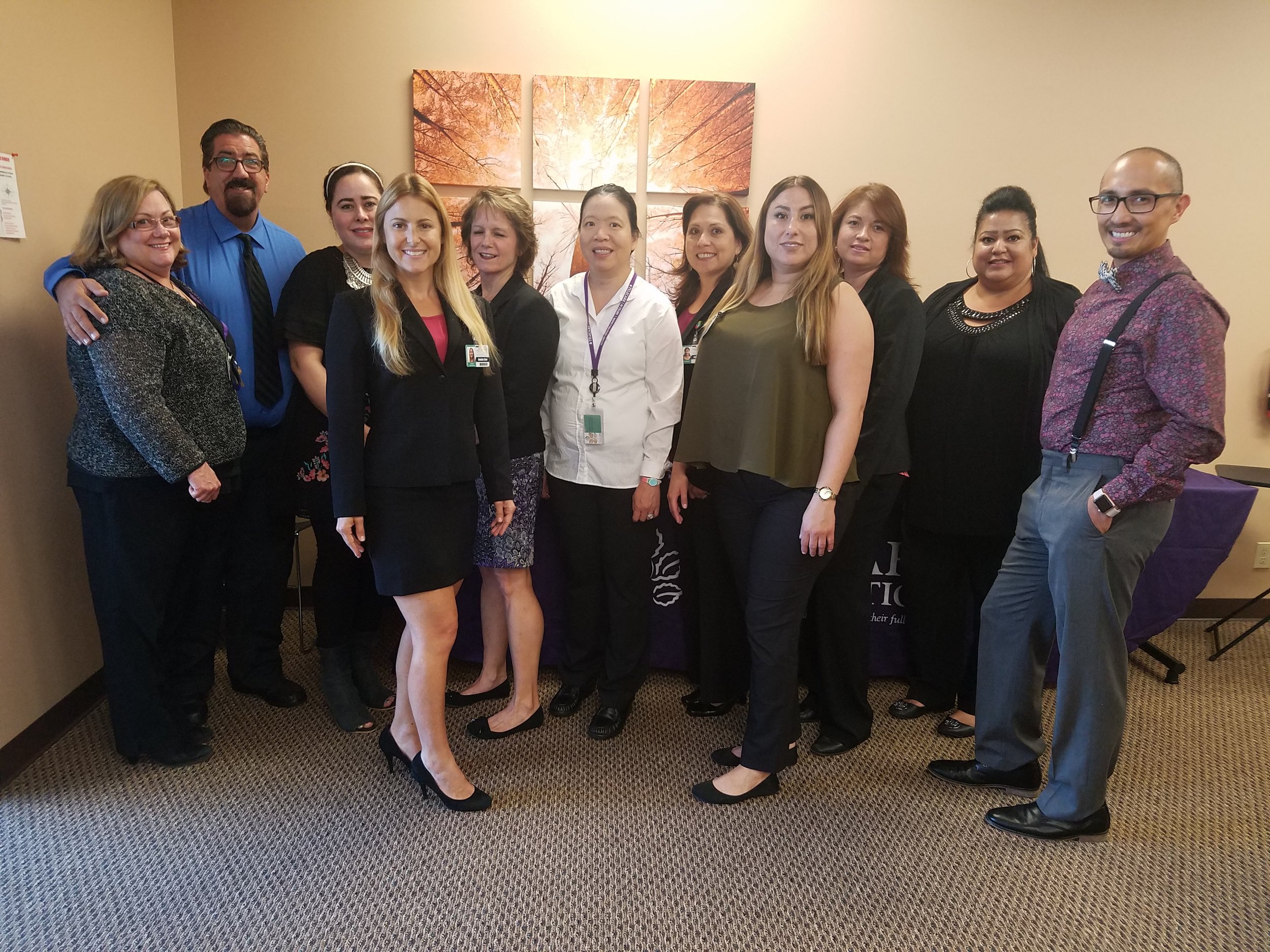
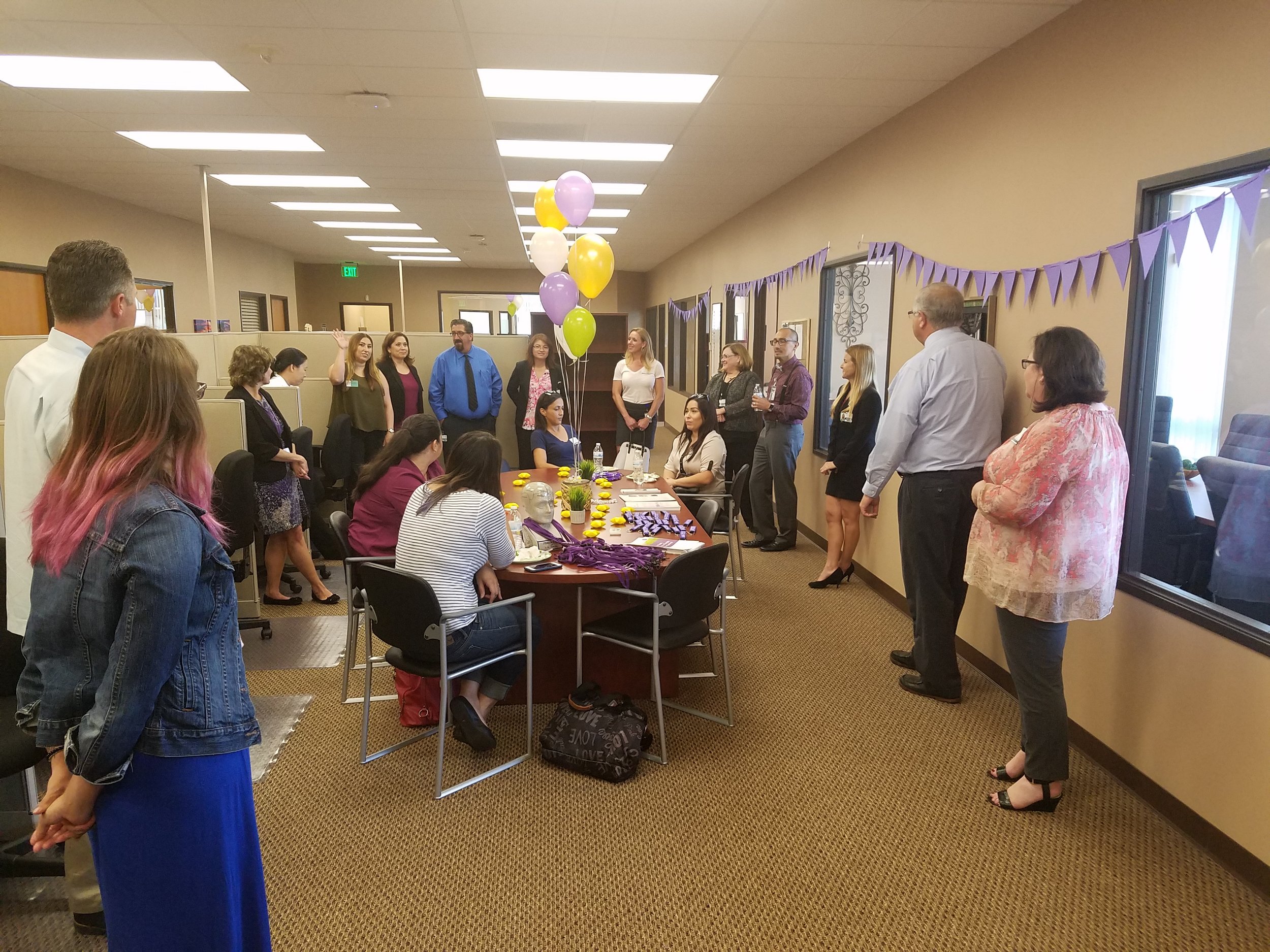
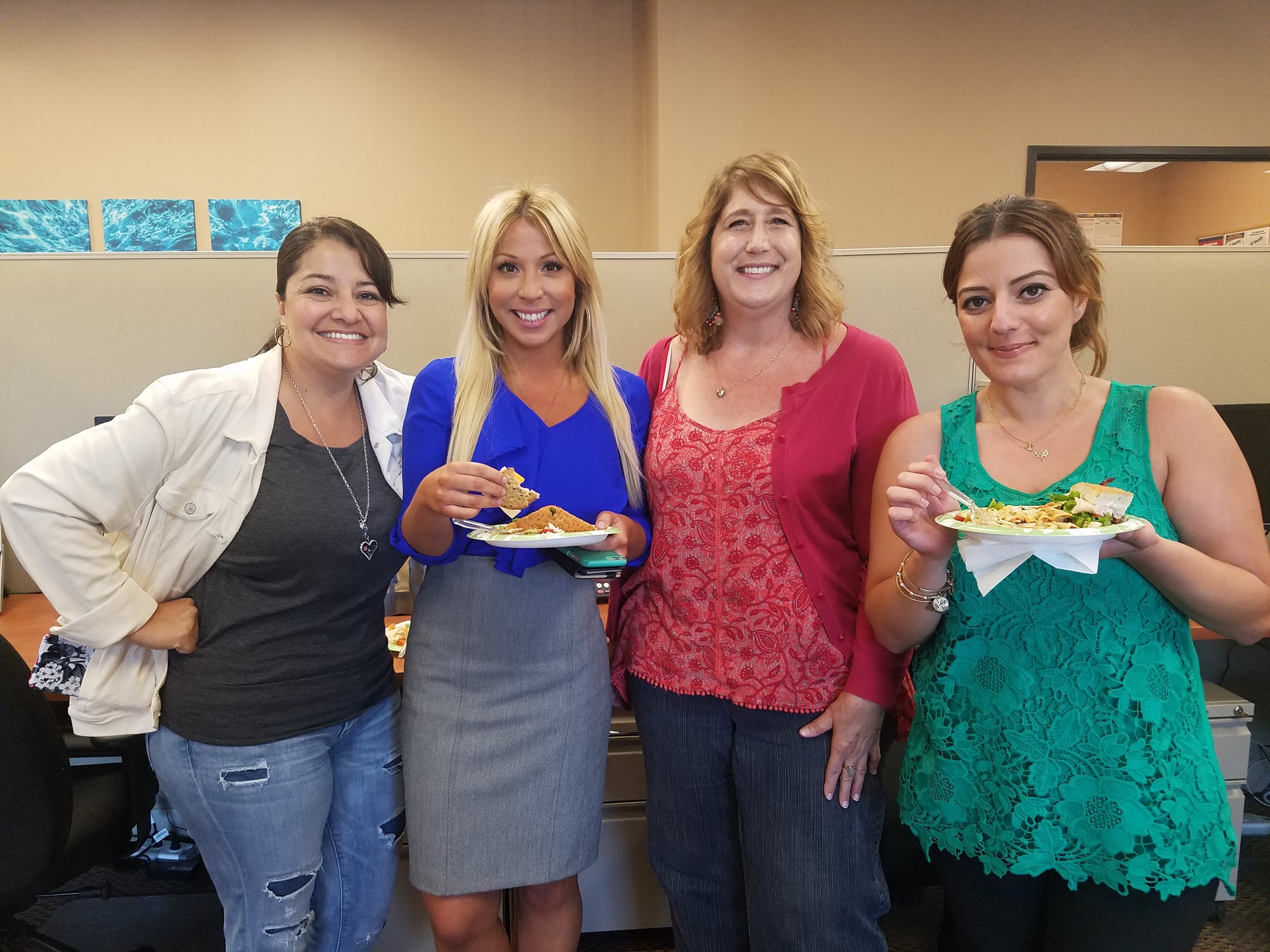
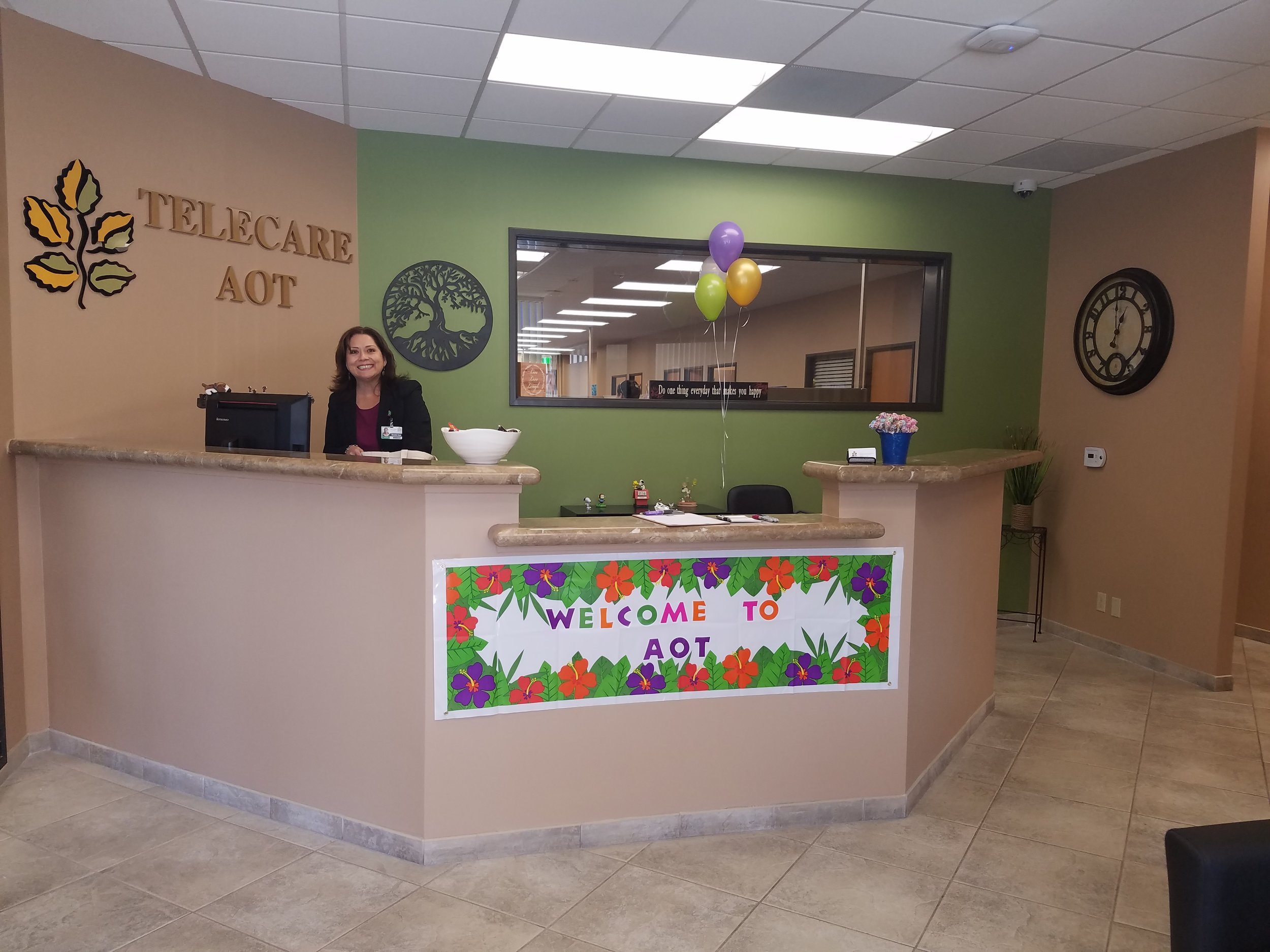
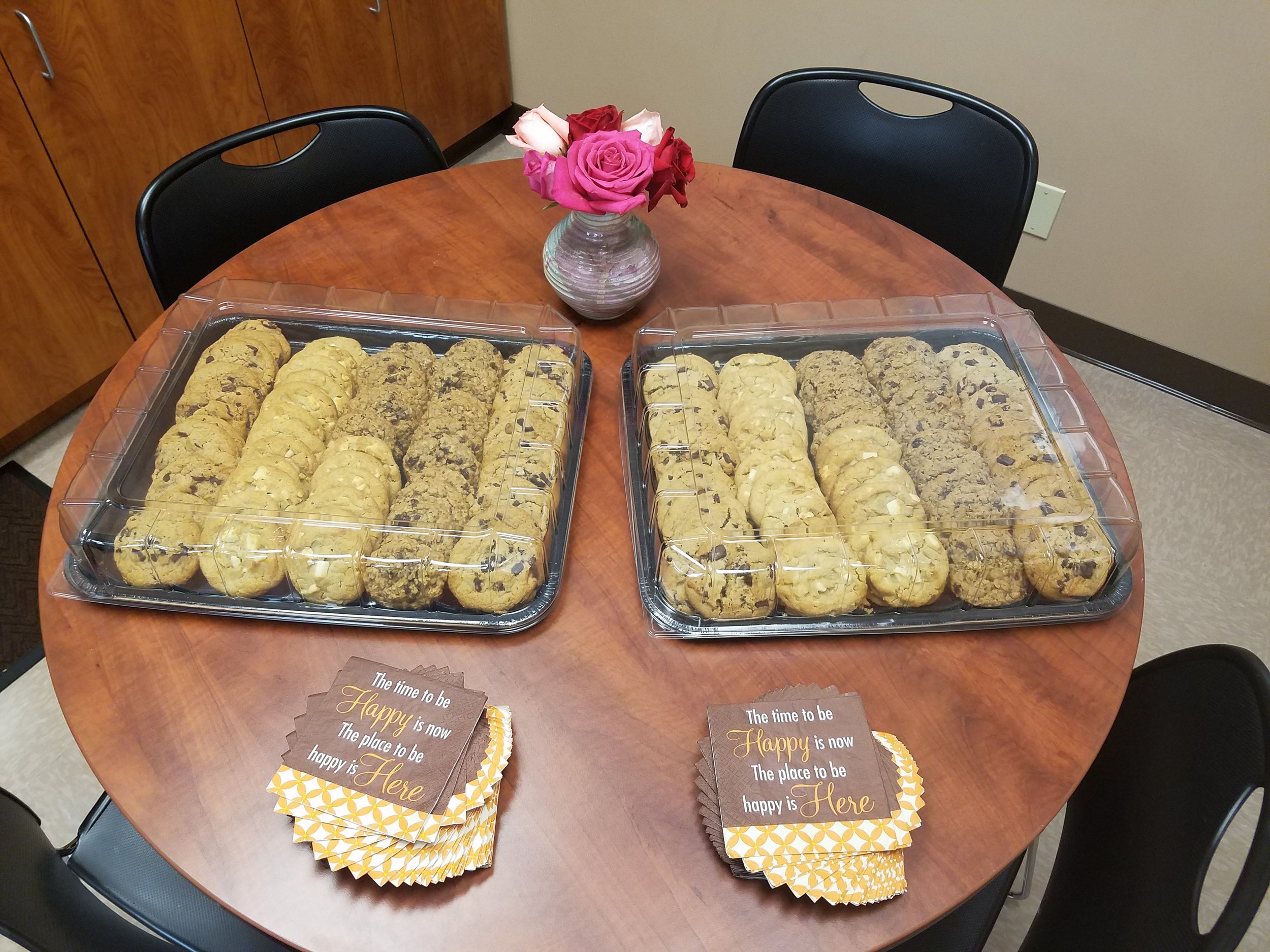
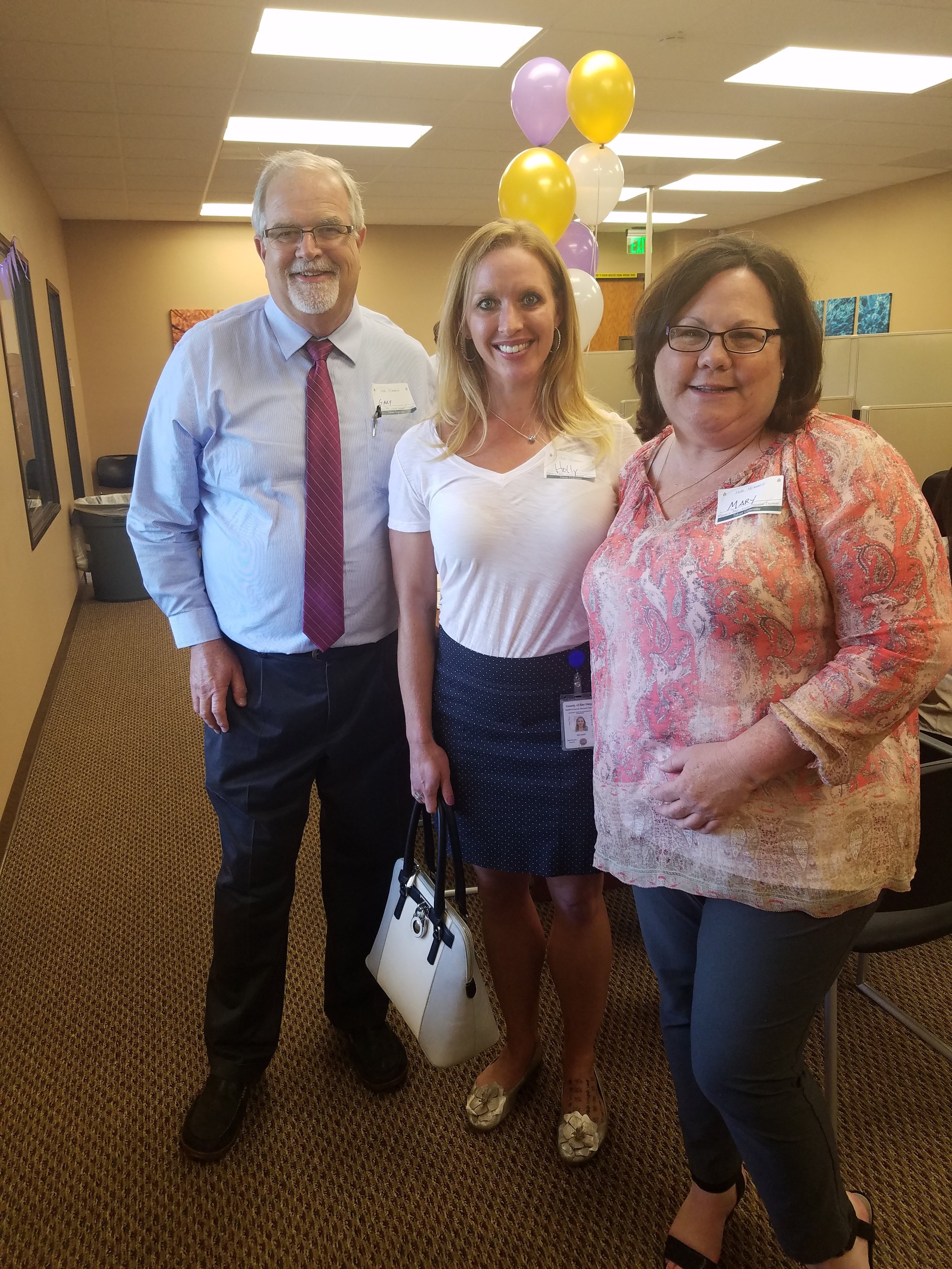
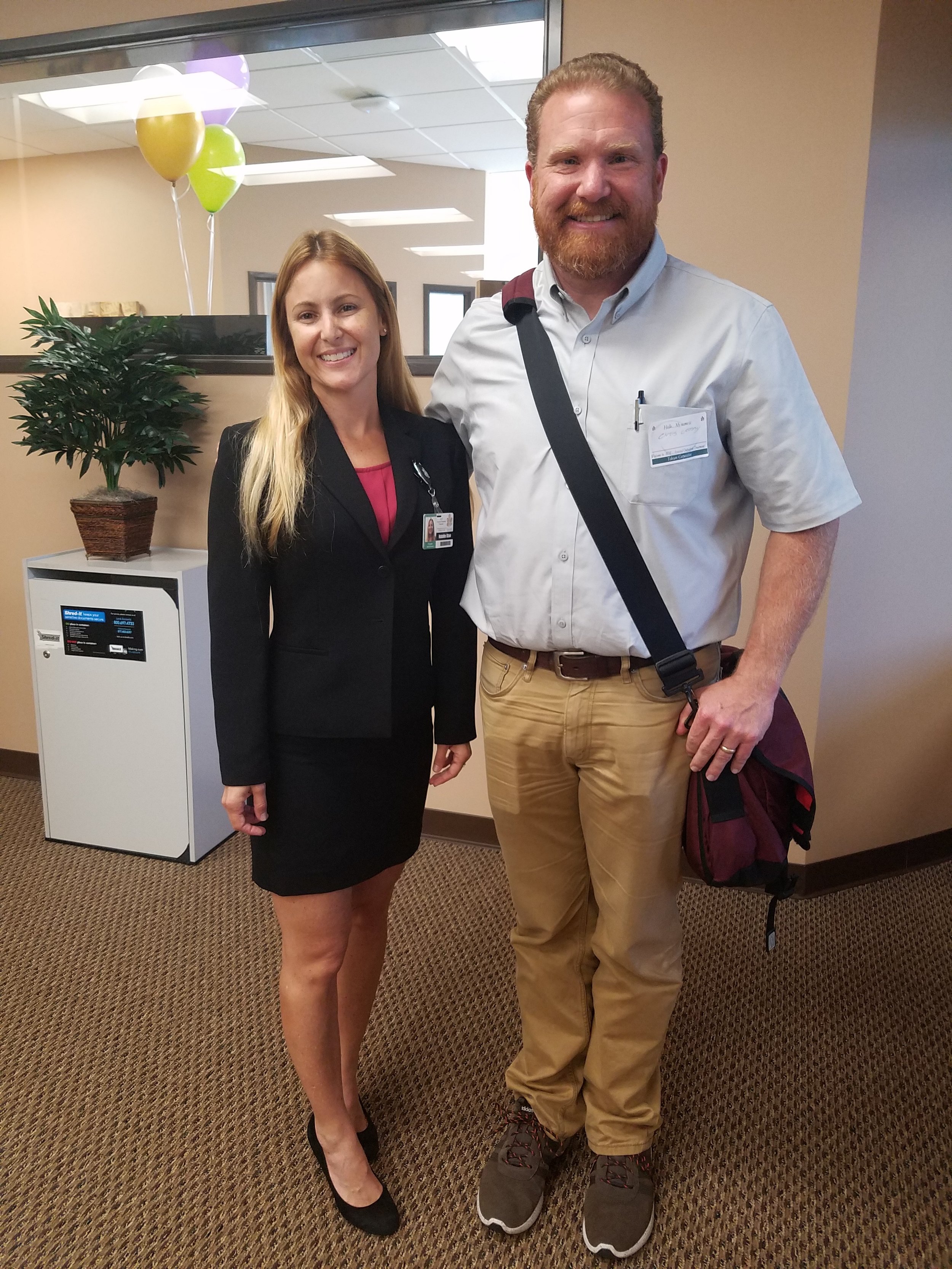
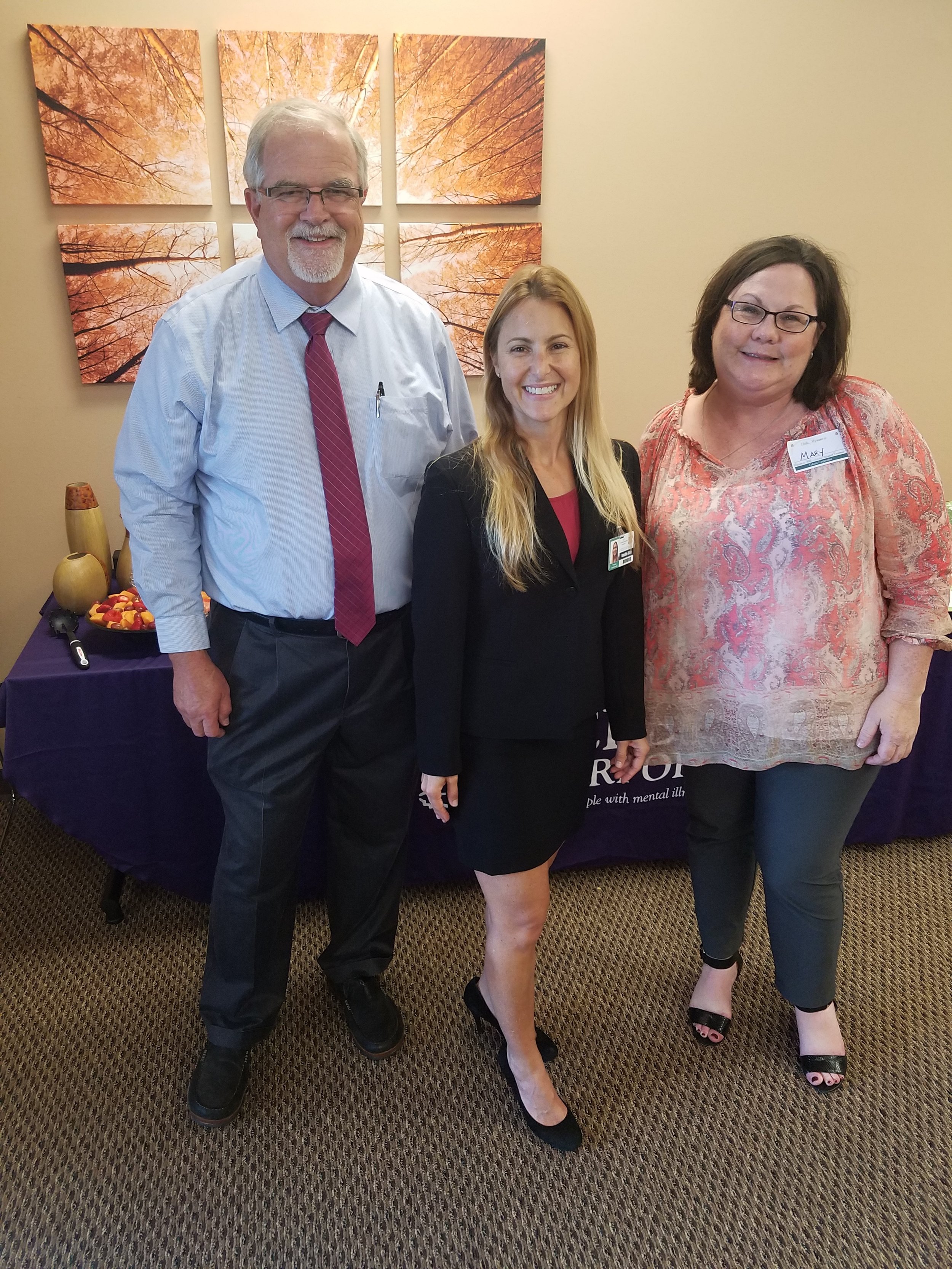
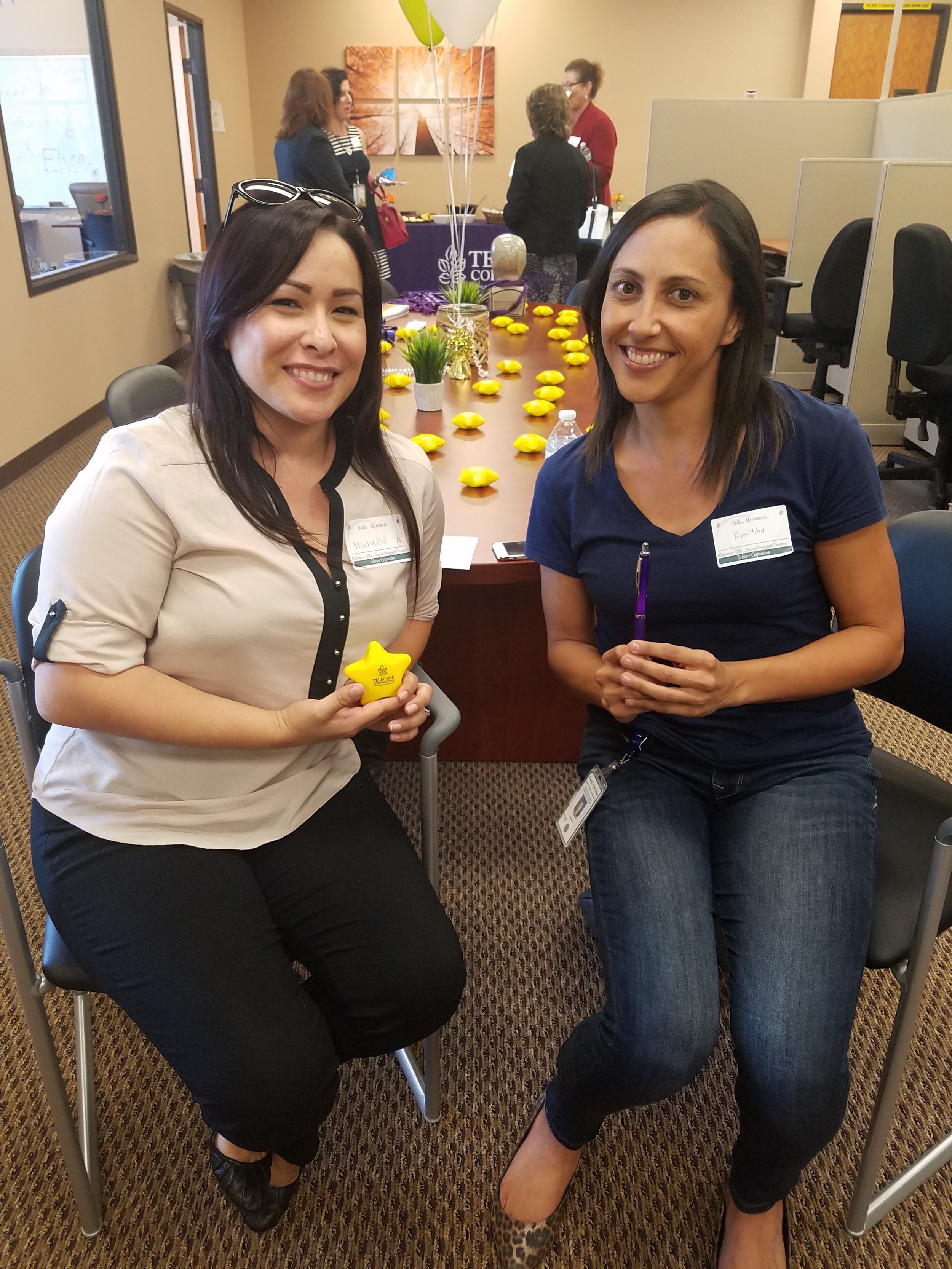
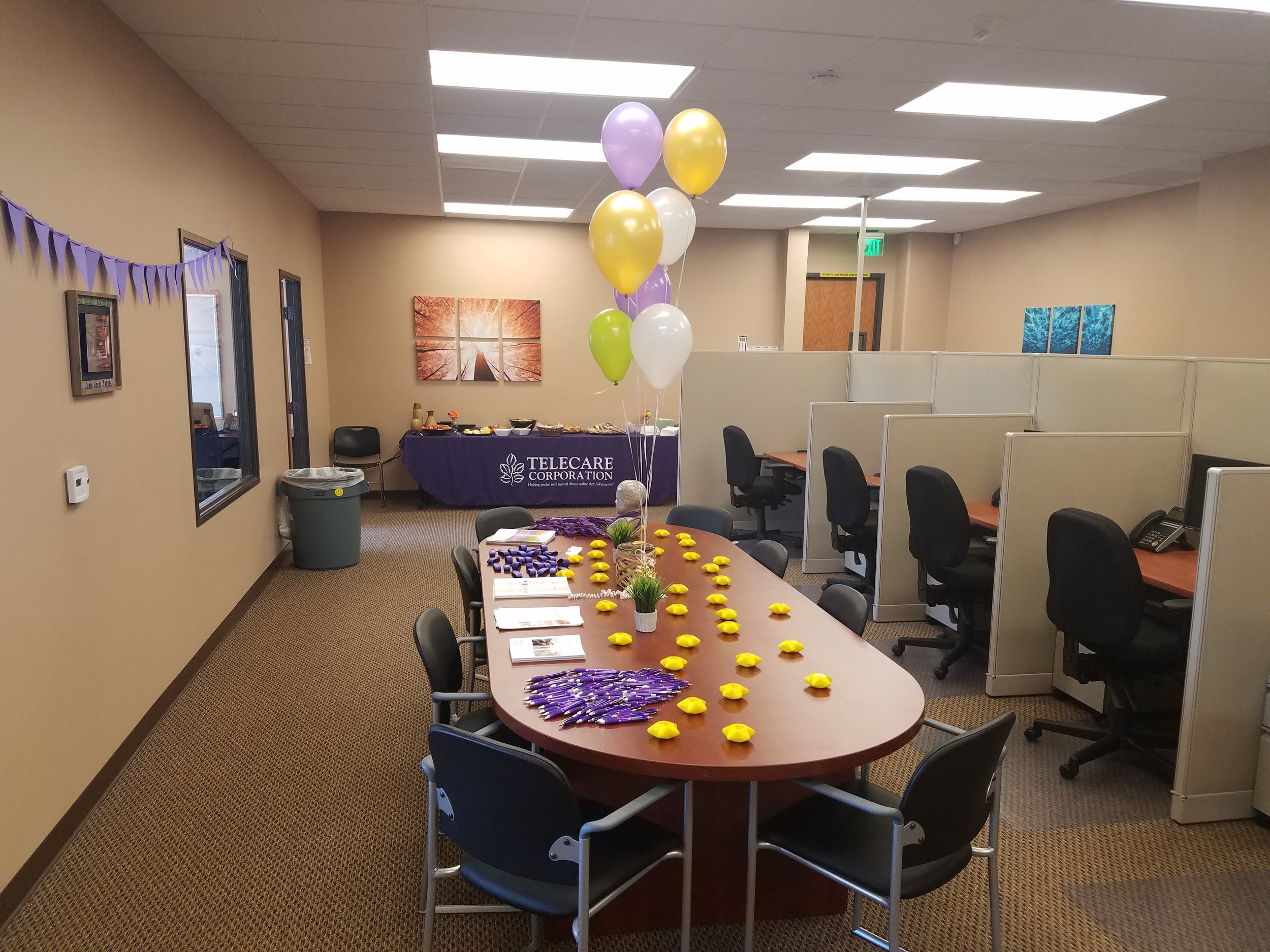
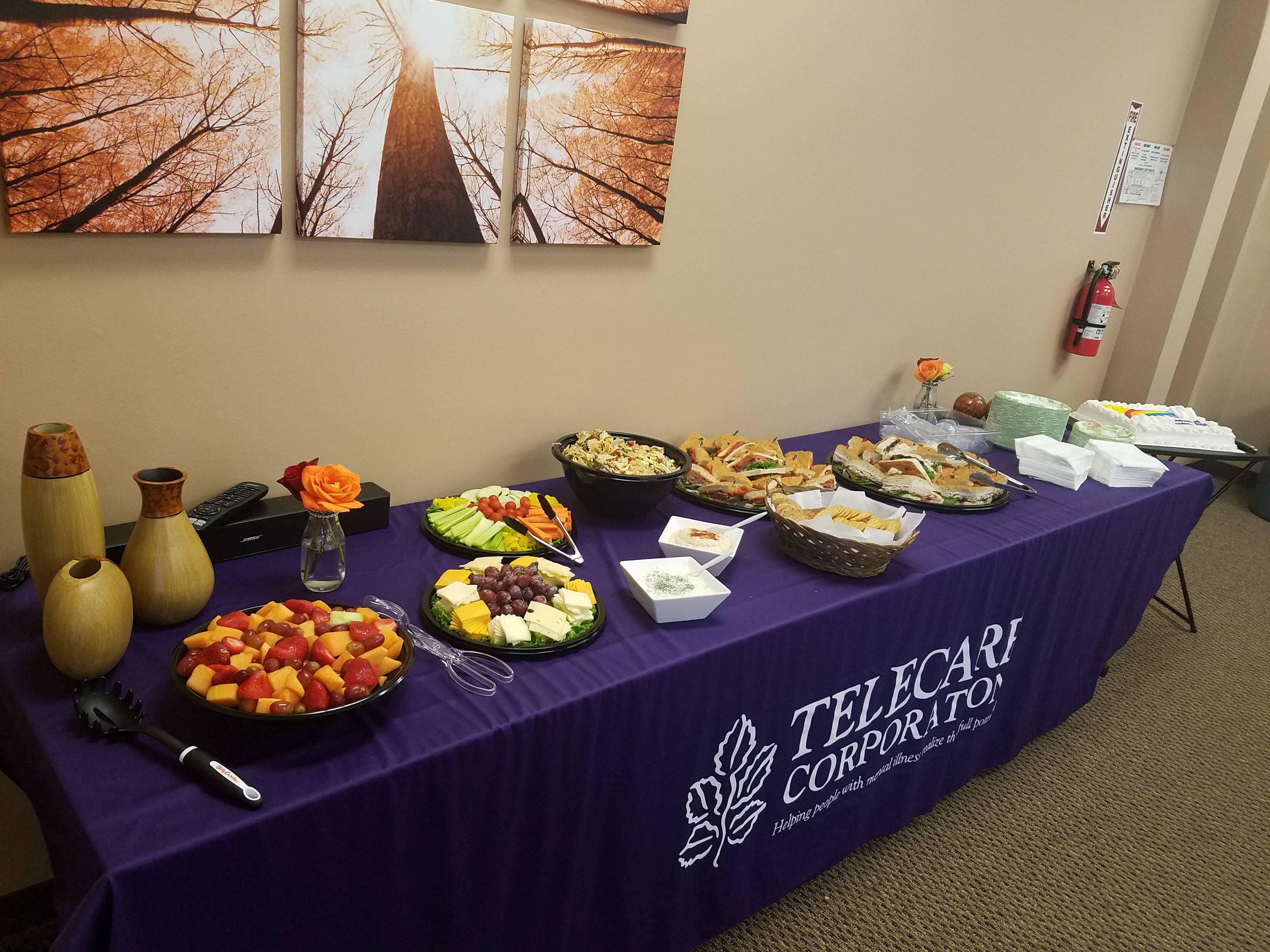
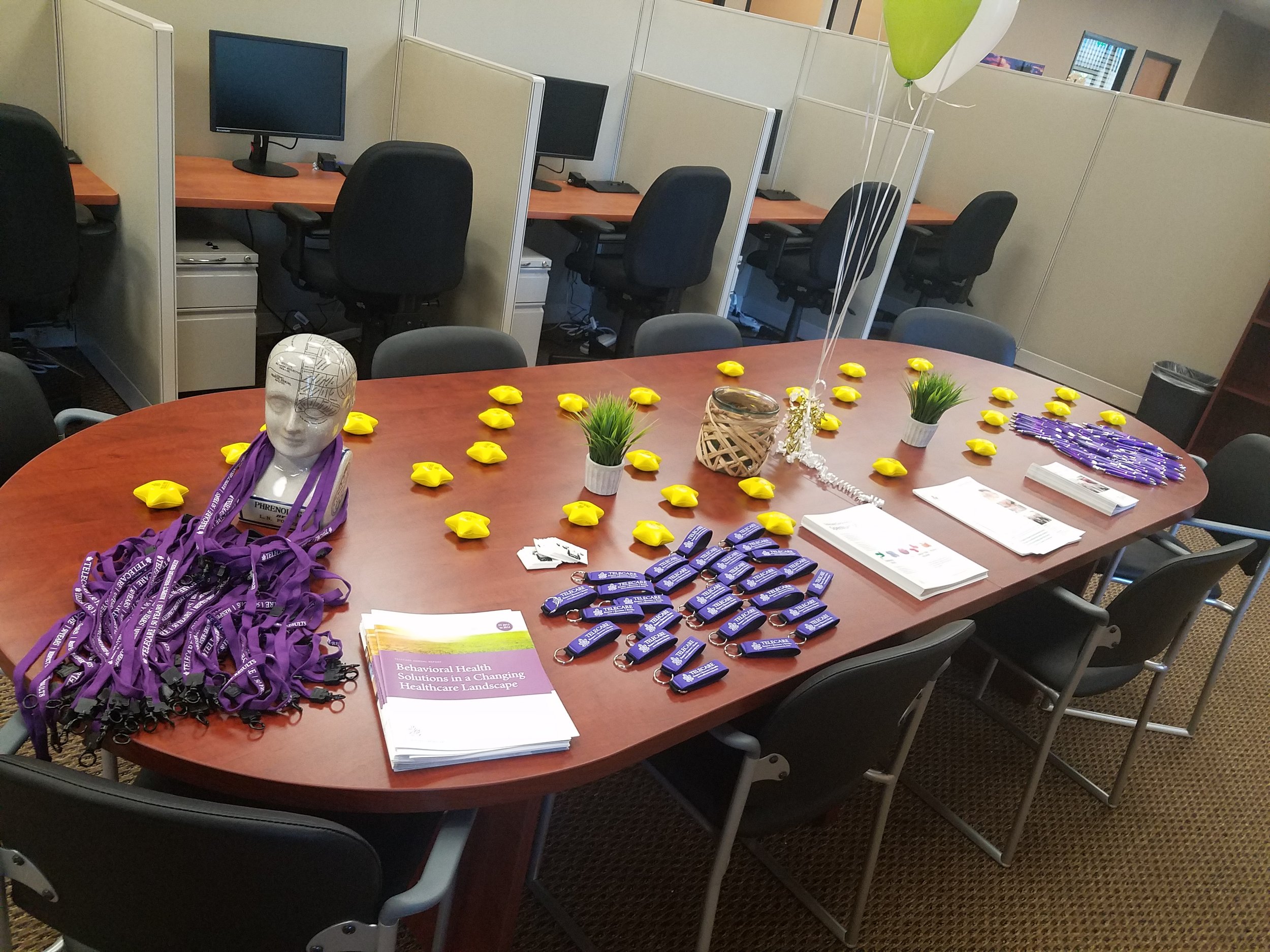
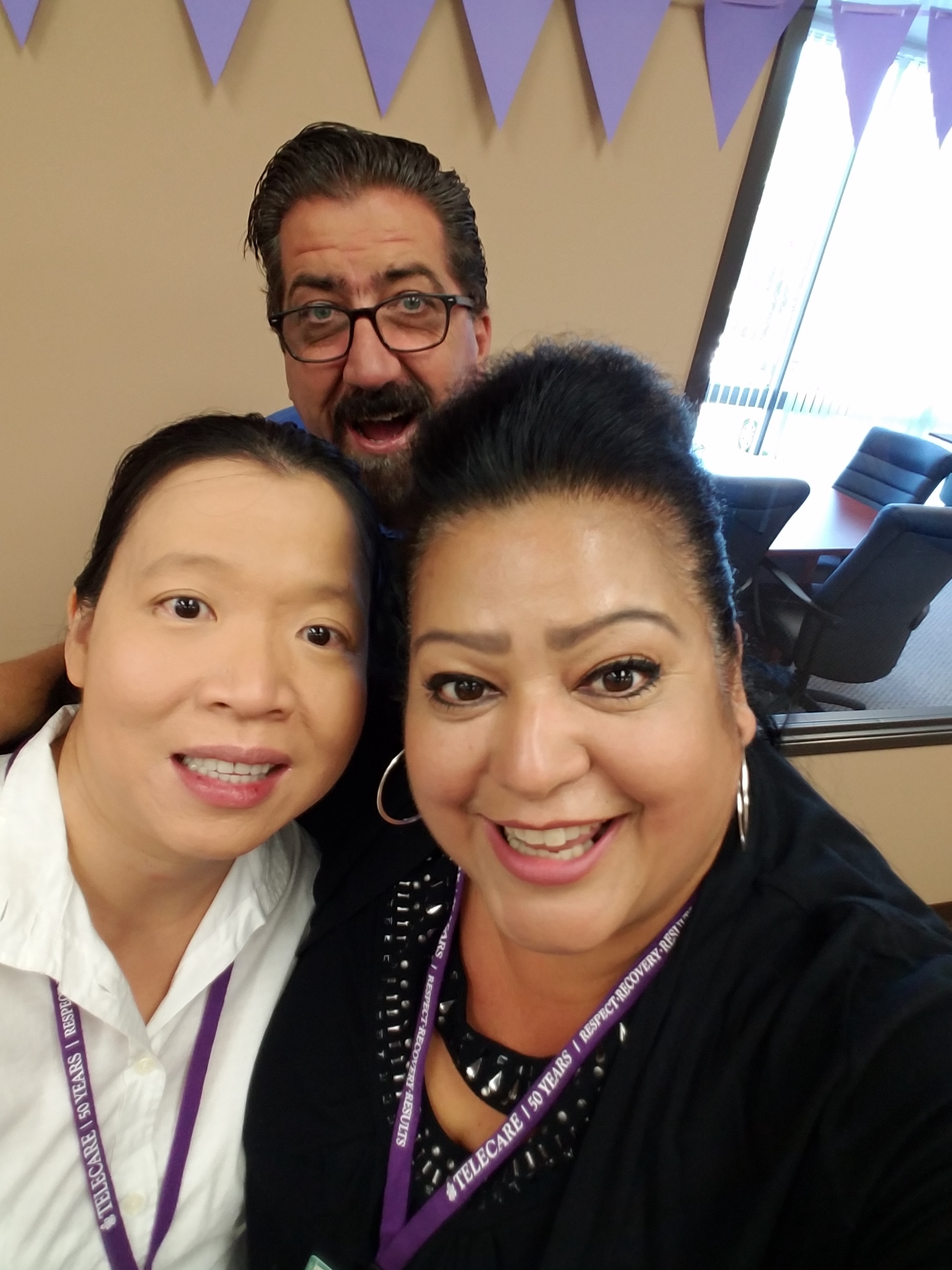
Last month, Telecare opened its first Laura’s Law program in Alameda County. The Alameda Assisted Outpatient Treatment (AOT) / Community Conservatorship (CC) program provides individuals who are living with a mental illness, who have been involved with the justice system, or have had repeated hospitalizations, with a safe course of care.
“I’m very happy we got this project,” said Administrator Bob McCreery. “Our hope is to create and maintain a relationship with our members like we do in our other programs: by going with somebody on their journey of recovery. Although this program is still in the early stages, we hope to continue our success of helping others.”
The AOT-CC’s goal is to help individuals to achieve recovery and reduce system costs. The program collaborates with the Public Guardian/Conservator’s Office, Alameda County’s four new IHOT teams, and John George Hospital, to engage individuals not effectively connected with the system of care, or who are overly connected to highly restrictive services such as the prison system or hospital emergency services.

Individuals are recommended for participation in the CC program by mental health professionals within John George Hospital in San Leandro, CA. Both AOT partners and CC partners will receive the same ACT-level services from the small but mighty AOT-CC team.
Because this is the first of its kind in Alameda County, family involvement and peer advisory will be emphasized in the AOT program. “People are really excited that we are engaging families and will be giving them a way to participate and provide feedback on how the program provides care,” said AOT-CC Clinical Director Penny Bernhisel. The program has a Family Advisory Board that meets on the third Thursday of the month and a Peer Advisory Board that also meets once a month.
Learn More:
Explore Our Court-Ordered Care Newsletter.
Explore Our JIMH Programs.
Telecare’s San Diego Mental Health Collaborative Court (MHCC) program welcomed the community to their open house on Friday, April 15.
The MHCC program is operated in partnership with San Diego County’s Health and Human Services Agency (HHSA)-Behavioral Health Services (BHS). The MHCC program helps people who are incarcerated and have a serious mental illness to successfully reenter the community. Assessment begins while people are still in jail, and services start as soon as they are released.
"We had a great turnout of members, HHSA administrators, local Telecare staff, and program staff," said Gary Hubbard, Vice President of Operations of Southern California. "During our welcome, several client members expressed unsolicited, heartfelt appreciation for the staff and program and shared how they have been helped in their recovery."
MHCC staff members work together with county officials, the county’s judicial system, and community programs to make each member’s reintegration process a smooth one. The primary focus of the program is to ensure members are set up with the proper resources and tools they will need to move forward without reoffending. Individuals must commit to the full 18 months in order to participate in the program, regardless of how many months they have left to serve in jail.
SAN DIEGO MHCC HOSTED AN OPEN HOUSE ON FRIDAY APRIL 15. STAFF, PROGRAM AND COMMUNITY MEMBERS, AND HHSA ADMINISTRATORS ATTENDED THE ON-SITE EVENT.

Returning to a community can be a huge challenge for individuals who have spent time in a prison environment. The situation becomes even more complicated when the individual has a serious mental illness and/or addiction disorder, and without the proper services they are further at risk of encountering the criminal justice system again.
This year, Attorney General Loretta Lynch designated April 24-30 as National Reentry Week to draw greater attention to the services and supports available for those returning to the community after having spent time in a prison environment. On Monday, the Department of Justice (DOJ) introduced a "Roadmap to Reentry" -- five guiding principles for reentry reform that will be implemented throughout the Bureau of Prisons (BOP).
According to a statement on the DOJ website, "These efforts will help those who have paid their debt to society prepare for substantive opportunities beyond the prison gates; promoting family unity, contributing to the health of our economy, and sustaining the strength of our nation."
The principles are as follows:
Principle I: Upon incarceration, every inmate should be provided an individualized reentry plan tailored to his or her risk of recidivism and programmatic needs.
Principle II: While incarcerated, each inmate should be provided education, employment training, life skills, substance abuse, mental health, and other programs that target their criminogenic needs and maximize their likelihood of success upon release.
Principle III: While incarcerated, each inmate should be provided the resources and opportunity to build and maintain family relationships, strengthening the support system available to them upon release.
Principle IV: During transition back to the community, halfway houses and supervised release programs should ensure individualized continuity of care for returning citizens.
Principle V: Before leaving custody, every person should be provided comprehensive reentry-related information and access to resources necessary to succeed in the community.
To download a PDF version of the Roadmap to Reentry, click here.
On March 21, the Department of Justice designated the week of April 24-30 as National Reentry Week.
According to Attorney General Loretta E. Lynch, “Supporting successful reentry is an essential part of our mission to promote public safety—because by helping individuals return to productive, law-abiding lives, we can reduce crime across the country and make our neighborhoods better places to live.”
Each year, more than 600,000 individuals return to their communities after serving time in federal and state prisons. The long term impact of a criminal record makes it extremely difficult for individuals who have served time to successfully reenter society. Common obstacles include obtaining employment, housing, education, and financial planning. More often than not, these obstacles can become barriers that contribute to the cycle of incarceration for many individuals.
What’s Happening Nationally
The goal of the National Reentry Week events is to assist in connecting individuals who are transitioning out of correctional facilities to resources and programs that focus on addressing criminogenic risk factors, or causes that lead individuals to reoffending and ending up back in jail. These risk factors can either be static factors that cannot be changed, such as age, gender, and criminal history, or dynamic factors that can be changed through successful interventions, such as substance use and education deficiencies.
During this week, the Department of Justice asked the Federal Bureau of Prisons and each U.S. Attorney’s Office to coordinate reentry events designed to help inmates prepare for release, like job fairs, practice interviews, mentorship programs, and events for children of incarcerated parents.
How We Support Reentry at Telecare
Telecare’s AB109 and collaborative court programs help formerly incarcerated members, or members who are on probation, transition back into their communities every single day. Our programs do this in a number of ways: case management, psychiatric services, employment and housing assistance, family support, and education. Additionally, Telecare’s AB109 programs use Critical Time Intervention (CTI), which aims to prevent recurrent homelessness and adverse outcomes during the period following placement into the community.
How are we doing at reentry support? We think the easiest way to understand this is to hear from staff and clients at
CORE LA and Downtown LA, two programs at Telecare that serve people with a history in the criminal justice system. These programs take a collaborative approach to recovery, and use the special talents of staff members who have experienced mental illness and incarceration themselves to provide support, guidance, and hope along the way.
(L-R) Natalie D. Blair, Program Administrator; Zenaida "Zee" Vega, Receptionist; Christine "Dee Dee" Ortego, PSC 3; Scott Jackson, PSC 3; Jane Sia-Flaherty, MHRS;
Sandra Tello, PSC 2; Amy Siez, Peer Support Specialist
Telecare is pleased to announce the opening of our fourth Laura’s Law program in California, created in partnership with San Diego County Behavioral Health Services: the Telecare San Diego Assisted Outpatient Treatment (AOT) Program. Our AOT programs offer wraparound, intensive supports for people who are court-ordered into care after meeting specific Laura’s Law criteria.
San Diego County’s Board of Supervisors approved the implementation of Laura’s Law in April 2015. This new AOT program enables the county to expand its safety net to people who need mental health services but have not been willing to engage in treatment.
The AOT program will operate in tandem with existing voluntary services called In Home Outreach Teams (IHOT). Residents in the north regions of San Diego can contact Mental Health Systems Inc. for IHOT referrals; residents in the central, east, and south regions can contact Telecare’s IHOT program. The IHOT teams will do their best to engage people in services on a voluntary basis. If a person refuses services, but meets the nine Laura’s Law criteria, the individual can be mandated into the AOT program to receive the support and services needed.
“Although the IHOT programs have been extremely successful in San Diego, the option of AOT is a valuable, additional tool we can use to help these individuals stay in contact with mental health resources that are designed to help them function more safely and securely in the community,” said IHOT Administrator Roselyna Rosado.
More about how IHOT and AOT link services and referral information can be found here.
This month, Telecare hosted a poster session at the 41st Annual Forensic Mental Health Association of California Conference in Monterey from March 16-18. The conference provides trainings and strategies for forensic mental health professionals.
"Justice Involved Mental Health and Telecare's Recovery Centered Clinical System" was presented by Gary Hubbard, Vice President of Operations of Southern California and Arizona, and Cheryl Malinowski, Regional Director over Telecare's Central Coast and CORE LA program.
Telecare’s poster focused on how a recovery-centered culture with intentional strengths-based conversations surrounding criminogenic needs can be effective in providing services for the justice involved mental health population.
If you would like more information on the RCCS approach to JIMH, please contact Gary Hubbard at ghubbard@telecarecorp.com or Cheryl Malinowski at cmalinowski@telecarecorp.com.

Cheryl Malinowski, Regional Director Central Coast and CORE LA, speaks to participants during the poster session at the Forensic Mental Health Association of California Conference on March 16, 2016.

Using Telecare's Recovery-Centered Clinical System (RCCS) to address JIMH issues has been key to creating a recovery-centered environment.
Telecare’s AB Services 109 (TABS 109) reintegration program, funded by Assembly Bill 109, works with members who are released from prison. The program works to address both mental health and criminogenic needs. TABS109 uses RCCS principles to create a welcoming, inclusive, and collaborative environment where staff use techniques such as motivational interviewing and reflective listening to connect with members on what they want to get out of their time in the program. In order to connect with members on a personal level, TABS109 also employs staff with lived experience to help encourage growth and support. This combined reintegration model has been extremely successful and to prove it, TABS109 has a 20% recidivism rate compared to the state’s 59%.
“Our peer component has really helped us engage with our clientele,” said Telecare’s Los Angeles Regional Operations Director Cheryl Malinowski. “New clients will come in to our programs so guarded because they are forced to be there. Then after being in a program for a couple of months, receiving treatment, they realize that staff genuinely cares for them.”


Staff member Rayzhone Davis takes pride in helping others identify their strengths. Rayzhone found himself in and out of juvenile hall and youth prison from the age of 13 to 18, and at 23 was given a jail sentence of seven years. When he got out, Rayzhone started to turn his life around by working on his Associates Degree in Alcohol and Drug Counseling, and was referred to TABS109 from the work he did at another substance use program. Two years, two promotions, and a degree later, he is now a Substance Abuse Counseling Specialist.
“My education, past living experiences, and our philosophy of RCCS helps me encourage members to look at life differently,” he said. “Working for Telecare has given me an opportunity to be a part of an ACT program, where I get to work in the community that I was raised in. My biggest joy is helping others who have the same struggles I overcame. The work I do has allowed me to give back to my community and use my past living experiences to help others to become the best people they can be.”
Housing Specialist Andrea Major, who also has a justice-involved past, applied to the TABS109 program to satisfy her probation terms. She found TABS109 to be a welcoming program that takes care of, believes in, and continuously prepares staff to reach their goals and move up in the organization.
“After almost three years working at Telecare, I am more aware of my identity and where I want to go. Telecare gave me a second chance and provided an environment that has allowed me the ability to grow and advance,” she said. “Telecare is about breaking barriers, not creating them.”
50 Years of Services to People With Serious Mental Illness